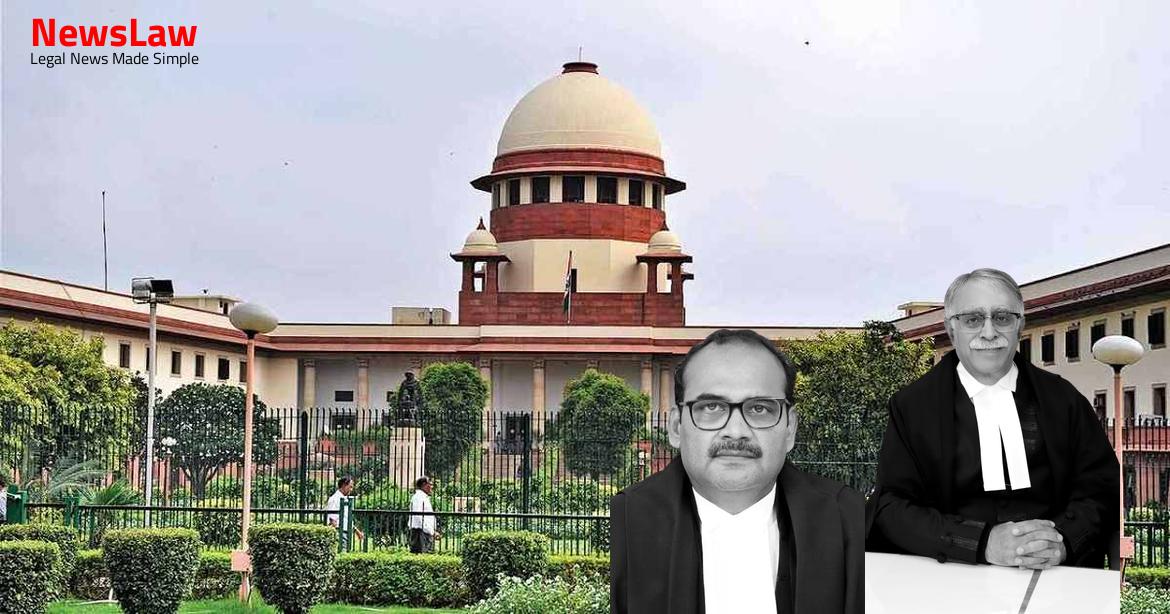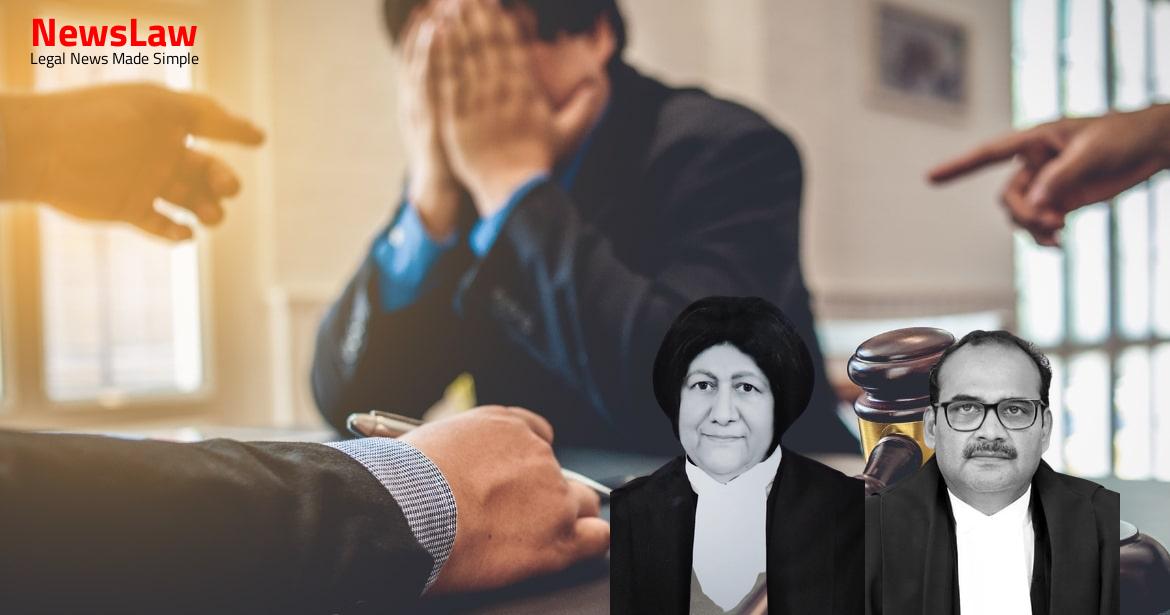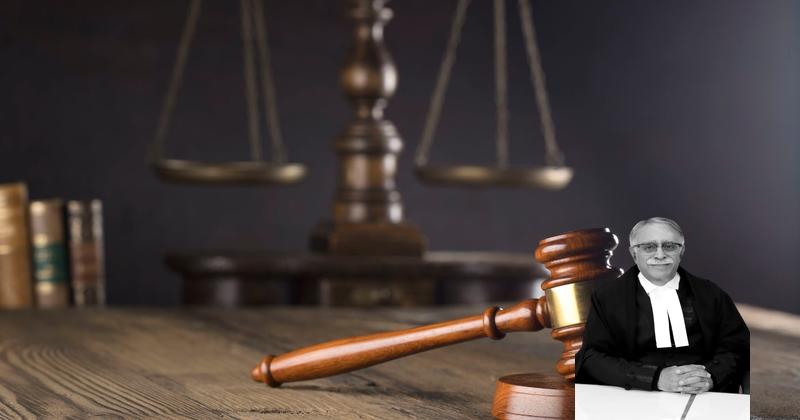In the case of State vs. Periyasamy and R. Manoharan, the Court delves into the intricacies of the right of private defence. The appellants challenge their convictions, raising questions about witness testimonies and investigative lapses. The right of private defence, as argued by Periyasamy, takes center stage amidst conflicting accounts and delays in lodging the FIR. Let’s dive into the legal analysis of this intriguing case.
Facts
- The Court considered R. Manoharan’s involvement in the offense, which was proven beyond reasonable doubt.
- Periyasamy’s unexplained injuries were not sufficient to dismiss the prosecution’s case.
- The Trial Court and High Court judgments were challenged in the present appeals.
- R. Manoharan was found guilty of abetting the murder of one person, while Periyasamy was held guilty of the murder of two individuals.
- Both Periyasamy and R. Manoharan were found guilty of attempted murder based on evidence from eyewitnesses.
- The High Court upheld the conviction and sentences of Periyasamy and R. Manoharan as per the Trial Court’s decision.
- On 3 March 2002, Dharmalingam demanded more brandy on credit from Saravana Wine Shop.
- A quarrel ensued leading to a showcase being smashed and bottles being damaged.
- During the incident, D-1 was stabbed by Periyasamy and succumbed to injuries on the way to the hospital.
- Sakthivel and D-2 were also injured in the altercation.
- Periyasamy was found to have caused fatal injuries to D-1 and stabbed Sakthivel repeatedly.
- Charges were framed against Periyasamy and R. Manoharan based on the investigation and witness testimonies.
Also Read: Landlord-Tenant Dispute Resolution
Issue
- The issue to be decided is whether the convictions of Periyasamy and R. Manoharan are sustainable based on the standard of proof beyond reasonable doubt.
- The court needs to consider the totality of facts, circumstances, and applicable laws in reaching a conclusion.
- The key question is whether the standard of proof has been met in the convictions of Periyasamy and R. Manoharan.
Also Read: Judicial Directions on Property Dispute Resolution
Arguments
- Events unfolded due to a spur-of-the-moment quarrel resulting in grievous injuries to Periyasamy.
- Periyasamy pleaded the right of private defence as an alternate argument.
- Delay in lodging the FIR was highlighted, especially considering PW-1 did not undergo surgery.
- No prior animosity or reason for discord existed.
- Periyasamy argued that all witnesses were ‘interested’ and therefore unreliable, with none being independent.
- The respondent has filed detailed submissions attempting to discredit the submissions on behalf of the accused persons.
- R. Manoharan’s presence at the scene of the crime was argued to have never been established.
Also Read: Quashing of FIR on Grounds of Civil Nature: Legal Analysis
Analysis
- The judgment deals with the analysis of the testimonies of PW-1 to PW-3, the prosecution witnesses primarily relied on by the Trial Court.
- Several inconsistencies and contradictions in the statements of the witnesses raise doubts about the reliability of their testimonies.
- The credibility of PW-3’s version is questioned due to his actions after the incident where he failed to seek immediate medical help for the injured.
- The role of the Investigating Officer (PW-22) comes under scrutiny for various lapses in the investigation process and lack of coordination.
- The lack of independent witnesses and the dependency on interested witnesses further weaken the prosecution’s case.
- Contradictions in the witness statements, delays in recording statements, and lack of scientific investigation at the crime scene are highlighted as major flaws.
- The judgment emphasizes the importance of the Investigating Officer in ensuring a fair and just criminal proceeding.
- The right of private defence is a valuable right serving a social purpose and should not be narrowly construed.
- Principles of the exercise of the right of private defence outlined in Darshan Singh v. State of Punjab & Anr and Sukumaran v. State.
- The right of private defence is recognized by civilized countries within reasonable limits.
- Private defence is available when confronted with imminent danger.
- Reasonable apprehension is sufficient to invoke the right of self-defence.
- The right of private defence commences when apprehension arises and ends when the danger subsides.
- Force used in private defence should not be disproportionate to the threat.
- Evidence by interested witnesses should be scrutinized with care but can be relied upon without corroboration if found truthful.
- Non-examination of independent witnesses not fatal to a prosecution case.
- Private persons examined as witnesses were interested and had inconsistencies
- Lack of independent witnesses
- Delay in filing the FIR
- Interpolations found on record
- Numerous lapses in the investigation
- Medical and scientific evidence does not support prosecution’s version
Decision
- Both appellants directed to be released if not required in any other case
- Pending applications to stand disposed of
- Appeals allowed, convictions set aside
Case Title: PERIYASAMY Vs. STATE REP. BY THE INSPECTOR OF POLICE (2024 INSC 212)
Case Number: Crl.A. No.-000270-000270 / 2019



